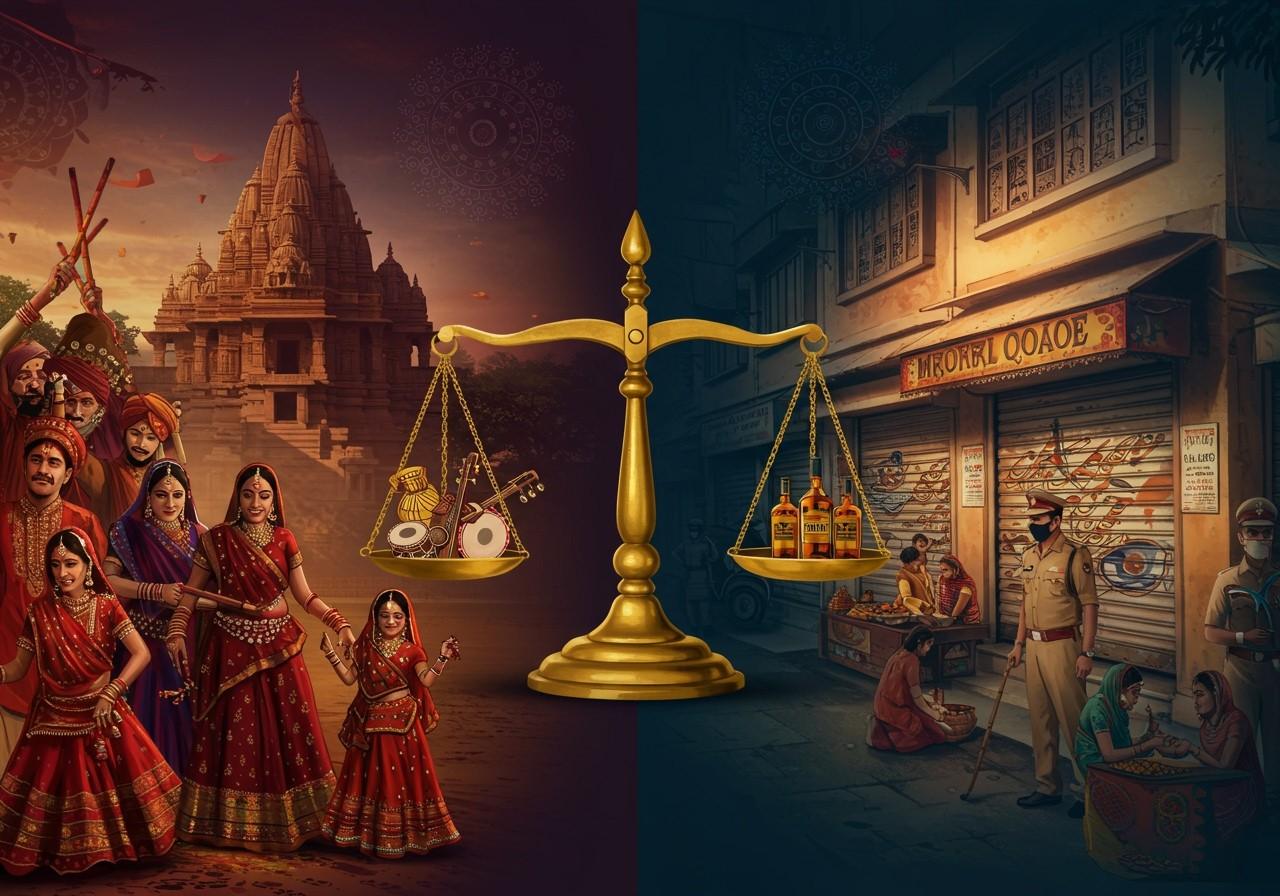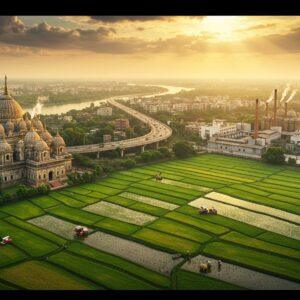
Gujarat, a state in western India renowned for its entrepreneurial spirit, rich cultural heritage, and historical importance, stands out for its unique status as a ‘dry state’. This means the sale, consumption, and distribution of alcohol are prohibited. This article delves into the reasons behind Gujarat’s dry state status, its impact on the state and its people, and addresses common queries about this distinctive policy.
Historical Context
Gujarat’s journey towards prohibition is deeply intertwined with its history and culture. Mahatma Gandhi, born in Gujarat, championed alcohol abstinence as part of his vision for a self-reliant and ethical society. The Bombay Prohibition Act of 1948 laid the groundwork for alcohol prohibition in the region, later becoming the Gujarat Prohibition Act in 1960 when the state was formed. This commitment to prohibition was further strengthened with stricter amendments in 2017, reflecting the state’s ongoing dedication to this policy.
Rationale Behind Prohibition
Several factors contribute to Gujarat’s alcohol prohibition. The state’s predominantly Hindu population culturally emphasizes temperance and moral conduct, aligning with Gandhi’s philosophy. Political motivations, backed by conservative groups, also play a role. Furthermore, health and social concerns, such as minimizing alcohol-related crime, health problems, and accidents, are key drivers. Economic considerations regarding productivity and public well-being also factor into the equation.
Societal Impacts
Alcohol prohibition has wide-ranging effects on Gujarati society. Economically, while there’s a loss of potential revenue from alcohol sales, other sectors like tourism and textiles have experienced growth. Socially, alcohol-related crimes and accidents have seen a reduction, although the illicit alcohol trade presents challenges. Culturally, traditional values are preserved, influencing social behavior and public health. However, the judiciary and administration face ongoing legal and enforcement challenges in upholding the prohibition, grappling with issues like spurious liquor and organized crime.
Economic Implications
Gujarat’s dry state status has significant economic dimensions. The potential revenue loss from alcohol sales is somewhat offset by other taxes and revenue streams. Businesses, particularly in hospitality and tourism, have adapted to the prohibition. The growth of non-alcoholic beverage industries and other sectors has potentially benefited from this policy. This status significantly shapes Gujarat’s economic strategies and priorities.
Cultural and Social Effects
Gujarat’s dry state status influences social events, festivals, and celebrations, with residents embracing alcohol-free gatherings. Prohibition reinforces traditional values and temperance. However, individuals seeking alcohol for personal or medicinal reasons face difficulties, with a prevalent illegal alcohol trade. Public opinion on prohibition is divided, with ongoing discussions about its relevance in modern society, especially given Gujarat’s international connections.
Legal and Enforcement Hurdles
Authorities face substantial difficulties enforcing prohibition laws. Despite stringent measures, problems such as the sale of spurious liquor, organized crime, and bootlegging persist. The Gujarat Prohibition Act, made stricter in 2017, aims to address these issues. However, critics argue that prohibition is unsuitable for a modern, globally connected world, suggesting Gujarat’s continued adherence to this policy is misguided.
Contemporary Discourse
Public opinion on prohibition is diverse. Some believe it safeguards cultural values and mitigates health risks. Others find it outdated, leading to more harm through illicit activities. The debate continues on whether Gujarat should retain its dry state status or adapt to evolving times. The negative impacts on the economy, politics, crime control, judiciary, and administration raise serious questions about the policy’s long-term viability.
Poojn.in: Supporting Gujarat’s Dry State Traditions
Gujarat’s dry state status creates unique needs for religious and cultural ceremonies. Poojn.in helps maintain these traditions while respecting state regulations by offering alcohol-free alternatives for ritualistic purposes:
-
Traditional Prayer Mats: Gongadi and Durrie mats are essential for meditation and spiritual practices. Available at Poojn.in, these mats provide comfort during extended prayer sessions and religious gatherings, promoting mindful practices without the need for intoxicants.
-
Ceremonial Alternatives: For rituals where alcohol might be used elsewhere, Poojn.in offers pure copper and brass vessels for water-based rituals, natural coconut water containers, Panchamrit ingredients for sacred offerings, and traditional spice mixes for non-alcoholic ceremonial drinks, ensuring respectful observance of traditions.
-
Supporting Local Craftsmanship: The Gongadi mats from Gujarat’s Kutch region, available on Poojn.in, are particularly significant. They represent local craftsmanship and cultural values, serving as perfect alternatives for ceremonies requiring pure and alcohol-free sitting arrangements.
-
Complete Puja Kits: Poojn.in supports Gujarat’s alcohol-free culture with complete puja kits focusing on traditional, non-alcoholic ritual items, helping families maintain their spiritual practices while adhering to state laws.
Shop now at Poojn.in for authentic ritual items that align with Gujarat’s dry state policies and cultural values. Explore our collection of Gomutra, Sindoor Pouches, and Agarbatti to enhance your spiritual practices.
Conclusion
Gujarat’s dry state status is more than a mere policy; it reflects the state’s unique history, cultural values, and societal priorities. Rooted in Mahatma Gandhi’s teachings, alcohol prohibition has profoundly shaped Gujarat’s social and economic landscape. While aiming to promote health, safety, and ethical conduct, it also presents enforcement and illicit trade challenges.
The policy’s impacts are multifaceted, influencing everything from economic development to social behavior. Businesses have adapted, finding new revenue and growth avenues. Residents continue navigating the complexities of life in a dry state, balancing traditional values with modern needs.
As debates continue about the efficacy and relevance of alcohol prohibition, Gujarat’s dry state status remains a testament to its commitment to cultural principles and public welfare. The state’s future hinges on whether it maintains this policy or adapts to changing times.
FAQs on Gujarat’s Dry State Status
Why is Gujarat a dry state? Gujarat’s dry state status stems from a confluence of factors: honoring Mahatma Gandhi’s principles, addressing alcohol-related issues, and upholding cultural values emphasizing temperance. The policy reflects a long-standing commitment to promoting a society free from the perceived negative consequences of alcohol consumption.
When did Gujarat become a dry state? Gujarat formally adopted prohibition in 1960, coinciding with its establishment as a separate state. This solidified the pre-existing prohibition policies inherited from the Bombay Prohibition Act of 1948, marking a pivotal moment in the state’s history.
How does Gujarat’s dry state status affect tourism? The dry state policy has a complex relationship with tourism. While some tourists might be deterred by the lack of legal alcohol, others are drawn to the state’s unique cultural landscape and the relative safety and order attributed to prohibition. The impact on tourism remains a subject of ongoing discussion.
Are there exceptions to Gujarat’s dry state status? Yes, there are limited exceptions. Foreigners and non-resident Indians with special permits can consume alcohol in designated hotels and clubs. This recognizes the needs of certain visitors while still upholding the broader principles of prohibition.
Does Gujarat’s dry state status affect its economy? The dry state status presents both challenges and opportunities for Gujarat’s economy. While it limits potential revenue from alcohol sales and may influence tourism, it has also fostered the growth of alternative industries and potentially contributed to a more stable social environment.
How does Gujarat enforce its dry state laws? Gujarat enforces its prohibition through strict regulations and law enforcement efforts. Regular checks, raids, and penalties aim to curb illegal alcohol production, distribution, and consumption. However, challenges persist due to the presence of a black market and organized crime.
Can residents of Gujarat consume alcohol? Residents of Gujarat can consume alcohol only under specific circumstances, such as possessing a medical permit or meeting certain criteria. These exceptions acknowledge legitimate needs while maintaining the overall framework of prohibition.
Why is Gujarat called a dry state? The term “dry state” signifies the prohibition of alcohol sale and consumption under state laws. This distinguishes Gujarat from “wet states” where alcohol is legally available, highlighting its unique legal and cultural stance.


